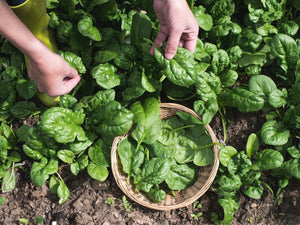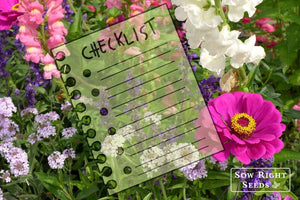What Is Compost Tea? Why You May Want This Home Brew Recipe
Curious about compost tea? There are gardeners who swear by it and those who say it’s a waste of time. The truth? It’s somewhere in between, and it all depends on how you make it and how you use it. We’ve used it from time to time in our gardens, and from our experience, it’s worth trying. In this article, we’ll explain what compost tea is, why gardeners use it, and how to make a simple compost tea at home. Once you try it, you can decide if this garden “brew” deserves a spot in your routine.

What is Compost Tea?
Compost tea is what it sounds like. It is a fermented liquid concentrate made by soaking or “brewing” compost in water. The tea-making process creates beneficial microbes for plants and soil. This type of tea is not something you want to sip, but your plants may appreciate the extra microbes it provides.
You may hear gardeners call a lot of things “compost tea”. They could be referring to everything from draining water off their compost bin to steeping manure with a thermometer and an aerator.
True compost tea is brewed to create a healthy concentration of microbes. The prepared tea will be a dark brown color and have an earthy smell.
Benefits of Compost Tea
Compost Tea is About the Microbes
The focus of compost tea is the microbes. Microbes play a crucial role in garden soil for several reasons. Microbes break down organic matter, improve soil structure, and suppress some diseases.
One thing to note is that there are many kinds of compost. Compost tea can be made from all of these, including manure. When manure is used in composting, an extra degree of caution is required due to the risk of E. coli contamination.
The quality of your compost tea will depend on the quality of your compost.
This may be why some gardeners achieve notable results, while others do not.
Compost tea has been used for centuries, but much of what was called compost tea was actually leachate, or fluid that drains off compost bins and manure piles.
Leachate vs Compost Tea
Draining water off your compost bin is technically leachate. This water will have the microbes from whatever is in your compost. That could include harmful pathogens such as Salmonella and E. coli. This runoff could have high levels of nutrients or not, depending on the quality of your compost.
Most leachate that has been studied is the leachate that comes from landfills and large commercial operations. For a backyard composter who does not use animal waste, leachate is usually safe for use in the garden. Hot compost that is over 130ºF will kill pathogens.
When using leachate, dilute it first with about 10 times the volume of water.
Is Compost Tea Better Than Compost?
Compost tea won’t take the place of healthy soil, and it won’t take the place of good compost. They each have their pros and cons, as well as their reasons for use.
Compost tea is primarily used to introduce beneficial microbes and address specific diseases.
Compost provides nutrients and organic matter that improve the texture of your garden soil.
We always recommend starting with good soil. Healthy garden soil is foundational. You’ll always be struggling to give your plants what they need if you don’t have nutrient-rich soil.
Compost tea won’t add organic matter to your soil. Adding compost to the soil improves your soil.
Compost tea will offer your plants more nutrients than plain water, but your plants and soil don’t necessarily need more microbes. But they always need a consistent supply of water.

Why Use Compost Tea?
Every gardener has their reasons for using compost tea. Some swear that it helps to prevent diseases. Others claim they have healthier plants. The application of compost tea at the right time can provide beneficial microbes to plants and soil.
It gives your plants a boost of natural nutrients and microbes.
It adds helpful microbes to the soil that support plant roots.
It can improve soil health and help plants resist disease.
From the University of Missouri Extension: “Compost tea has been used for centuries to enhance plant performance, but it has been only recently that its strong disease suppression characteristics have been recognized. Most of the organisms delivered to plant leaf surfaces by compost tea will parasitize, antagonize, or steal food from disease organisms to the point that they can no longer compete. Tea that infiltrates into the soil will protect plant roots in much the same way.” Source: University of Missouri Extension

How Do You Make Compost Tea? (Basic Version)
You don’t need fancy equipment to make a simple compost tea. Here’s the easiest method:
Use finished compost. Fully broken-down compost should smell earthy. It should be small particles no larger than a quarter.
Fill a bucket with clean water. Fresh rainwater is best. Let chlorinated tap water sit for 24 hours before using.
Add compost. To make it easier to strain later, place the compost in a sock or a fine-mesh bag that is tightly closed. A good ratio of compost to water is about two cups of compost per 5-gallon bucket.
Let it steep.The tea needs to sit for 2 or 3 days. While it sits, stir the water 2 or 3 times a day to add oxygen to the water. You will want to keep the tea out of direct sunlight so it doesn’t kill the microbes. Also, avoid letting it become too hot or too cold.
Strain the tea. Use fine mesh or cloth if you plan to use compost tea in a sprayer.
Use it right away. Pour compost tea around the plant's roots or spray it on the leaves. After it has brewed, you don’t want it to sit around and start growing harmful pathogens.

How Do You Apply Compost Tea?
Foliar treatment. If you strain it, compost tea can be applied to the leaves with a sprayer. This is what makes compost tea preferable for those looking for immediate use by the plant. With the right type of microbes present, foliar compost tea can outcompete disease organisms.
A soil drench.Water the ground around the plant stem. Pull away any mulch you have first, or the microbes will stay on the mulch and not soak into the soil.
Compost tea can be applied to all garden plants as well as your lawn grass.

Important Notes:
Use fresh, healthy compost. Bad compost = bad tea.
A longer brewing time doesn’t make it better. Without oxygen, harmful bacteria can grow.
Once compost tea has been brewed, use it right away. Compost tea can go bad quickly.
There are “aerated” and “non-aerated” versions. For beginners, the non-aerated (no pump needed) method is just fine. Don’t let equipment keep you from trying compost tea.
Put the strained compost back into your compost bin, and it will make great compost.
Beneficial bacteria are the most essential part of compost tea. Don’t let it create pathogens that are harmful to humans.
Clean buckets, bubblers, sprayers, and all equipment after brewing tea.
Apply compost tea in the evening so it has more time to work before the microbes are broken down by sunlight.

Daryl shared his experience with making and using compost tea:
To make compost tea, I took worm castings and compost and put them in a cotton bag.
This went into a 5-gallon bucket. I then used a bubbler from a fish tank. This got the air bubbling into the water and juiced up the oxygen.
At this point, I added a little molasses - need some sugar to encourage more bacteria to grow.
I then let this brew for 2 or 3 days.
When it was ready, I made sure it was strained and applied it as a foliar spray.
I’ve also applied it to the soil. I removed the mulch first. Otherwise, it would have just sat on top of the mulch.
Can definitely tell when you use it. The plants grew really well.
Compost tea is a method for introducing beneficial microbes to your soil and plants. How well it works will depend on the quality of the compost you start with. As there are so many variables, it is hard to say that you will get the same results as another gardener or even the same results from one year to the next.
Give compost tea a try if your soil or plants need a boost of microbes. And, as always, healthy soil with available nutrients for plant uptake is what your garden needs.
Have your soil tested if you think it lacks the essential nutrients for growing healthy plants. Amend your soil as needed with well-rotted compost to continue creating the best soil for your garden.
Popular Posts
-

How to Grow the Sweetest Spinach Leaves You'll Ever Taste
-

What to Plant in June: Vegetables, Flowers & Maintenance Tips







Leave a comment